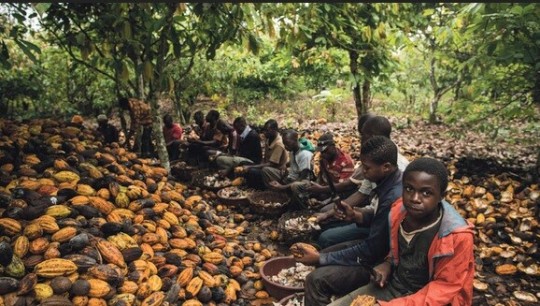#westafrica
Explore tagged Tumblr posts
Text

At peace 🥰
#black tumblr#blackout#africa#african#ghana#black out#darkskyn#melanin#ghanaian#black girl#me#my pics#my photos#my post#my upload#african girl#west africa#african girls#ghana woman#ghanaian girl#ghana girls#ghana girl#westafrica#bikini goals#girls in bikinis#bikini body#bikini#slim thicc#slim thick#slimthick
54 notes
·
View notes
Text

"Djabi", acrylic on canvas, 46 x 65 cm
Instagram : @jenekacy_art
#afro art#west africa#african spirituality#acrylicillustration#acrylicpainting#illustration#mali#beauty#love#protection#africanspirituality#witches of color#bambara#peulh#djabi#henna art#henna#westafrica#atr#contemporary art#africanart#african traditional religions
62 notes
·
View notes
Text
The WAVE at the morning light. there’s no creation without tradition, no one creates from nothing. Busua, Western Filmed on- @apple iPhone 15 Pro MaxCostume designer- @ladysossavi #ghana #film #busuabeach #africa #
64 notes
·
View notes
Text
Mali has issued an arrest warrant for Mark Bristow, the CEO of Barrick Gold, a major company that has operated in the country for 30 years.
17 notes
·
View notes
Text
Loving Hut Abidjan, Côte d’Ivoire 🌱🍽️🌍 Loving Hut Vegan Cuisine. 200+ restaurants, 30+ countries. Find plant-based delights near you at LovingHut.com
✨✨✨✨✨✨✨✨✨✨
💗 Please join Supreme Master Ching Hai to sincerely thank God Almighty for World Vegan, World Peace and souls’ Liberation 💗 Every day at 9:00 PM Hong Kong time 🙏
SupremeMasterTV.com
#SupremeMasterTV#LovingHut#PlantBased#VeganRestaurant#WhatVegansEat#Abidjan#CôtedIvoire#IvoryCoast#WestAfrica
12 notes
·
View notes
Text

🇨🇩#RDF #M23 #ADF
📌
https://x.com/matovuGodfrey6/status/1875646608261706009?t=toKjA4sLRu6JGkBvu6OtfA&s=19
#uganda#east africa#south africa#bobi wine#kampala#africa#struggle_for_africa#eastafrica#west africa#africa_united#DRCongo#congoisbleeding#WestAfrica#ugandaisbleeding
3 notes
·
View notes
Text

New Blog. Yoruba Orisha Ochosi and Early Yoruba Civilization
Yoruba mythology is a rich tradition from West Africa. Yoruba myths share stories of gods, heroes, and the power of nature. Ochosi is the Yoruba god of hunting and archery.
To find out more about Yoruba Orisha Ochosi and early Yoruba civilization in ancient and medieval West Africa, click here: https://shorturl.at/cEQRD
#yoruba#orisha#ochosi#mythology#africa#ancient#medieval#westafrica#yorubaland#civilization#god#nature#archery#warriors#hunters#tradition#forest#jungle#afterlife#heaven#childern#nigeria#benin#togo
5 notes
·
View notes
Text

Happy World Chocolate Day?
Well, not if you're one of the >1.6 million kids slaving away in West Africa (or Brazil or Latin America) for up to 14 hours/day, sometimes literally as slaves, under dangerous conditions, to produce the majority of the chocolate sold by the major candy companies, including Mars Wrigley, Ferrero, Mondelez International, Meiji Co. Ltd., Nestle and Hershey Co.
In 2021, SCOTUS ruled 8-1 that Big Chocolate had no responsibility to ensure that their products were not produced by child laborers.
#WorkingClass#LaborHistory#ChildLabor#chocolate#SCOTUS#slavery#WestAfrica#ghana#IvoryCoast#ausgov#politas#auspol#tasgov#taspol#australia#neoliberal capitalism#anthony albanese#fuck neoliberals#albanese government
19 notes
·
View notes
Text
#MalnutritionAfrica#AfricanUnion#NutritionPolicy#AfricanDevelopmentBank#EndHunger#ChildHealth#NutritionForGrowth#WestAfrica
2 notes
·
View notes
Video
youtube
Ibn Battuta - Bio Quotes
#youtube#Wanderlust#TravelCommunity#MiddleEast#WestAfrica#Africa#India#Maldives#SriLanka#China#travelblogger#TravelTales#GlobalTraveler#TravelWriting#travelogue#travelculture#WorldHeritage#WorldCulture#CulturalHeritage#Quotes#Biography#NetherTales
5 notes
·
View notes
Text
Ouuuwee
#black tumblr#blackout#africa#african#ghana#black out#darkskyn#melanin#ghanaian#black girl#me#my video#my pics#my photos#my post#ghanaian girl#ghana girl#ghana girls#west africa#african girl#african girls#afrikan beauty#westafrica#black girls are beautiful#black girl beauty#allbeautifulblackwomen#fckyeahprettyafricans#fckyeahbeautifulblackgirls#allbeautifulblackgirls#allbeautymatters
37 notes
·
View notes
Photo





Anthony Briscoe’s photostream
2 notes
·
View notes
Text
Why Are Africans Risking Their Lives for Europe? A Deep Dive into the Migration Crisis
The Mediterranean Sea has become a symbol of both hope and despair for thousands of Africans seeking a better life in Europe. According to Moroccan authorities, 78,685 attempts to cross the Mediterranean were stopped last year alone—a 4.6% increase from the previous year. These staggering numbers reveal a deeper crisis: the desperate lengths people are willing to go to escape poverty, poor…
#AfricanDiaspora#AfricanFuture#AfricanLeadership#AfricanMigration#AfricanUnity#ColonialLegacy#EconomicInequality#EuropeDream#GovernanceFailures#HopeAndDespair#MediterraneanCrisis#MigrationDebate#MigrationRisks#MigrationStories#Morocco#PovertyInAfrica#StopIllegalCrossing#ThirdWorldChallenges#WestAfrica#YouthUnemployment
0 notes
Text

Empowering West African Shea Butter Producers to Thrive in the Global Market
Shea butter, often referred to as "women's gold," has become a beacon of hope for small producers and agricultural cooperatives across West Africa. As global demand for natural, sustainable, and ethically sourced products continues to rise, shea butter offers a unique opportunity for local communities to not only participate in the global economy but also drive sustainable development. This article explores proven strategies and actionable insights for West African shea butter producers to unlock their full potential in the international market. Through real-world success stories, we’ll uncover how quality, innovation, and collaboration can transform challenges into opportunities, empowering producers to thrive while preserving their cultural heritage and natural resources.
1. Quality is King: Building Trust Through Excellence
In the competitive natural products market, quality is non-negotiable. West African producers must prioritize:
- Rigorous testing procedures to ensure purity and consistency.
- Certifications (organic, fair trade, etc.) to validate authenticity and meet global standards.
- Continuous improvement in production techniques to maintain high-quality outputs.
Success Story: The Ojoba Women's Shea Cooperative
The Ojoba Women's Shea Cooperative in Ghana exemplifies the power of quality. By implementing strict quality control measures and securing organic certification, they’ve built trust with international buyers, including major cosmetics brands like L’Occitane. Their commitment to excellence has not only boosted their income but also elevated their reputation in the global market.
Additional Insight
Producers can leverage local testing facilities and partner with international certification bodies to streamline the certification process, ensuring their products meet global standards without excessive costs.
2. Embrace Traceability and Transparency: Telling the Story Behind the Product
Modern consumers value transparency and want to know the story behind their purchases. Producers should:
- Document sourcing locations and production processes.
- Highlight sustainable practices and their positive impact on local communities.
- Use technology (e.g., QR codes) to allow consumers to trace the product’s journey.
Success Story: The Tungteiya Women’s Association
The Tungteiya Women's Association partnered with The Body Shop to create a transparent supply chain. By implementing a traceability system, they’ve empowered consumers to track their shea butter from tree to table. This transparency has strengthened their market position and fostered long-term partnerships.
Additional Insight
Producers can collaborate with tech startups to develop affordable traceability solutions, making it easier to share their stories with global audiences.
3. Harness the Power of Collaboration: Strength in Unity
Collaboration amplifies impact. Small producers should:
- Form or join cooperatives to increase bargaining power and reduce costs.
- Share knowledge and resources to improve production efficiency.
- Engage in collective marketing to access larger markets.
Success Story: The Global Shea Alliance
The Global Shea Alliance has united over 500 members across 35 countries, creating a powerful network for knowledge sharing and market access. Their collaborative efforts have driven a 600% increase in shea exports from West Africa over the past two decades.
Additional Insight
Cooperatives can partner with NGOs and government agencies to access training, funding, and market linkages, further strengthening their collective impact.
4. Develop Market Intelligence: Understanding the Global Landscape
Market intelligence is critical for success. Producers should:
- Research niche markets (e.g., luxury skincare, organic food).
- Stay updated on consumer trends (e.g., vegan, cruelty-free products).
- Innovate by developing new shea-based products (e.g., shea-infused chocolates, candles).
Success Story: Baraka Shea Butter
Baraka Shea Butter identified a growing demand for ethically sourced shea butter in North America. By targeting this niche, they’ve grown their business significantly, supplying over 1,000 skincare brands.
Additional Insight
Producers can use free or low-cost tools like Google Trends and social media analytics to gather market insights and identify emerging opportunities.
5. Prioritize Sustainability: Protecting the Future
Sustainability is a competitive advantage. Producers should:
- Participate in reforestation and sustainable harvesting initiatives.
- Adopt eco-friendly practices to minimize environmental impact.
- Promote biodiversity in shea-growing areas.
Success Story: The ICCO Shea Parkland Project
The ICCO Shea Parkland Project in Ghana combines shea production with environmental conservation. By training communities in sustainable practices, they’ve increased yields while preserving biodiversity, attracting premium buyers who value sustainability.
Additional Insight
Producers can partner with environmental organizations to access funding and technical support for sustainability initiatives.
6. Focus on Value-Added Products: Capturing More Value
Moving up the value chain maximizes returns. Producers should:
- Develop cosmetics (e.g., lotions, soaps) and culinary products.
- Create specialized products for different market segments.
- Invest in small-scale processing equipment to produce finished goods.
Success Story: Ele Agbe
Ele Agbe, a women-led company in Ghana, transitioned from selling raw shea butter to producing value-added products like soaps and creams. This shift has increased their profits and created jobs in their community.
Additional Insight
Producers can collaborate with local universities or research institutions to develop innovative shea-based products.
7. Highlight Health and Wellness Benefits: Tapping into the Wellness Trend
Shea butter’s natural properties are a major selling point. Marketing should emphasize:
- Rich antioxidants and vitamins (e.g., vitamin E).
- Moisturizing and anti-inflammatory properties.
- Health benefits as a natural alternative to synthetic products.
Success Story: Savannah Fruits Company
The Savannah Fruits Company successfully marketed their shea butter’s health benefits, securing partnerships with natural skincare brands in Europe and North America.
Additional Insight
Producers can collaborate with influencers in the wellness space to amplify their marketing efforts.
8. Invest in Branding and Packaging: Standing Out in the Market
Strong branding differentiates products. Producers should:
- Develop eco-friendly, attractive packaging.
- Create a brand identity that reflects cultural heritage and quality.
- Use storytelling to connect with consumers.
Success Story: TAMA Cosmetics
TAMA Cosmetics in Burkina Faso built a strong brand around traditional knowledge and eco-friendly packaging, breaking into high-end markets in Europe and the Middle East.
Additional Insight
Producers can use crowdfunding platforms to raise funds for branding and packaging improvements.
9. Embrace E-commerce: Reaching Global Customers
E-commerce opens doors to global markets. Producers should:
- Set up online stores or partner with e-commerce platforms.
- Use social media for marketing and customer engagement.
- Offer international shipping to expand reach.
Success Story: Karitè
Karitè leveraged e-commerce to sell directly to customers in over 30 countries, significantly increasing their profit margins.
Additional Insight
Producers can use platforms like Shopify or Etsy to create affordable online stores.
10. Seek Strategic Partnerships: Expanding Opportunities
Partnerships provide access to resources and markets. Producers should:
- Collaborate with cosmetics companies for technical and market support.
- Engage with NGOs and government agencies for funding and training.
- Pursue fair trade partnerships to ensure equitable pricing.
Success Story: The Shea Yeleen Cooperative
The Shea Yeleen Cooperative partnered with Sundial Brands, increasing their incomes by over 200% through technical support and fair pricing.
Additional Insight
Producers can attend trade fairs and industry events to network and build partnerships.
11. Forming Cooperatives: Strength in Unity for Quality, Cost-Sharing, and Market Access
One of the most effective ways for small-scale shea butter producers to compete in the global market is by forming or joining cooperatives. Cooperatives enable producers to pool resources, share costs, and collectively address challenges that would be difficult to tackle individually. By working together, producers can:
- Ensure consistent quality through shared quality control measures and standardized production processes.
- Reduce costs by pooling resources for equipment, certifications, and logistics.
- Strengthen export marketing and sales by leveraging collective bargaining power and accessing larger markets.
- Share knowledge and best practices to improve production efficiency and product quality.
Key Benefits of Cooperatives
- Quality Control: Cooperatives can establish centralized processing facilities with standardized procedures, ensuring consistent quality across all members’ products.
- Cost Efficiency: By sharing the costs of certifications, packaging, and transportation, members can reduce individual financial burdens.
- Market Access: Cooperatives can negotiate better prices and terms with buyers, access larger export markets, and participate in international trade fairs.
- Empowerment: Cooperatives often provide training, financial support, and a platform for women (who make up the majority of shea butter producers) to take on leadership roles.
Success Story: The Shea Network Women’s Cooperative (Ghana)
The Shea Network Women’s Cooperative in Ghana is a prime example of how cooperatives can transform small-scale producers into global competitors. By pooling resources, the cooperative invested in modern processing equipment and obtained organic and fair trade certifications. They also established a centralized quality control system, ensuring that all products met international standards.
Through collective marketing efforts, the cooperative secured contracts with major international buyers, including cosmetic and food companies. By sharing the costs of logistics and export documentation, members were able to access premium markets in Europe and North America. As a result, the cooperative’s members have seen a significant increase in their incomes, and the cooperative has become a model for others in the region.
Actionable Insights for Forming Cooperatives
1. Start Small, Think Big: Begin with a small group of committed producers and gradually expand as the cooperative gains momentum.
2. Establish Clear Governance: Develop a transparent governance structure with elected leaders and clear rules for decision-making, profit-sharing, and conflict resolution.
3. Invest in Training: Provide members with training on quality control, sustainable harvesting, and business management to ensure the cooperative’s success.
4. Leverage External Support: Partner with NGOs, government agencies, and international organizations to access funding, technical assistance, and market linkages.
5. Focus on Women’s Empowerment: Since women dominate shea butter production, ensure that cooperatives prioritize gender equality and provide opportunities for women to lead and thrive.
Additional Insight
Cooperatives can also explore digital tools to streamline operations, such as mobile apps for tracking production, sales, and member contributions. This can enhance transparency and efficiency, making the cooperative more attractive to buyers and investors.
Conclusion
The global shea butter market offers immense potential for West African producers to transform their communities and economies. By focusing on quality, sustainability, and innovation, and by learning from the success stories of cooperatives like Ojoba, Tungteiya, and the Shea Network Women’s Cooperative, producers can carve out a significant niche in the international marketplace.
Forming cooperatives is a particularly powerful strategy, enabling small producers to pool resources, ensure quality, and access global markets. The journey from local production to global success is not without challenges, but the reward, economic growth, community empowerment, and environmental preservation, are well worth the effort.
As West African shea butter continues to gain recognition as a premium, sustainable product, the future looks bright for producers who embrace these strategies. By working together, leveraging technology, and staying true to their roots, West African shea butter producers can not only compete on the global stage but also lead the way in sustainable and ethical business practices. The golden opportunity is here, it’s time to seize it.
I hope you enjoyed reading this post and learned something new and useful from it. If you did, please share it with your friends and colleagues who might be interested in Agriculture and Agribusiness.
Mr. Kosona Chriv
Group Chief Sales and Marketing Officer
Solina / Sahel Agri-Sol Group (Ivory Coast, Senegal, Mali, Nigeria, Tanzania)
Chief Operating Officer (COO)
Deko Group (Nigeria, Cambodia)
Senior Advisor
Adalidda (India, Cambodia)
Follow me on
BlueSky https://bsky.app/profile/kosona.bsky.social
LinkedIn https://www.linkedin.com/in/kosona
Photo: Shea butter (credit: Sahel Agri-Sol / Adalidda / Public Domain)
#SheaButter#WestAfrica#SustainableBusiness#WomenEmpowerment#FairTrade#OrganicProducts#NaturalSkincare#SheaButterBenefits#GlobalMarket#Sustainability#Agribusiness#WomenInBusiness#EthicalSourcing#ValueAddedProducts#Ecommerce
0 notes
Text

🌞 The countdown is on! Just 7 days until BSL & Solar Nigeria! 🌟
I’m beyond excited to showcase how our groundbreaking technology is set to transform residential and commercial energy like never before! Nigeria Energy
📍 Booth No.: D30 🗓 Dates: October 15th - 17th | Daily 10:00 - 17:00 📍 Venue: Landmark Centre, Lagos
✨ Get your FREE pass: https://register.visitcloud.com/survey/1e4vb1xz6wn4s?actioncode=WEB1&formType=Visitor%20Registration&formName=Visitor_Registration_Form&reportSuite=Informapowernigeria&_gl=11aqzzab_gcl_auNDU2NTY2ODA4LjE3MjgzNzI3NDA._gaMTIyNzA5OTU1MC4xNzI4MzcyNzQ2_ga_9TQ05NDNQP*MTcyODM3Mjc0Ni4xLjAuMTcyODM3Mjc0Ni42MC4wLjA.
Want to dive deeper into our innovative solutions? Visit us at: https://www.lithium-battery-factory.com/energy-storage/
I can't wait to connect with you and drive your business forward! Let’s light up the future together! ☀
0 notes
Text

✍🏿 *#FearlessOctober1*🇳🇬
3 notes
·
View notes